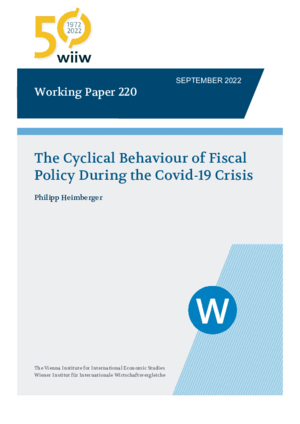The Cyclical Behaviour of Fiscal Policy During the Covid-19 Crisis
wiiw Working Paper No. 220, September 2022
37 pages including 9 Tables and 3 Figures
This paper analyses the cyclicality of fiscal policy (discretionary versus automatic) for 28 advanced economies over 1995-2021 by paying special attention to the Covid-19 crisis. We find evidence that discretionary fiscal policy during the Covid-19 crisis (2020-2021) was significantly more countercyclical than before – in particular in the Eurozone. We do not find comparable evidence for more counter-cyclicality during the financial crisis or Euro crisis, which lends support to the argument that discretionary fiscal policy responded especially forceful to stabilise the economy during the Covid-19 crisis. Furthermore, automatic fiscal stabilisers contributed significantly to counter-cyclical stabilisation, although their performance over 2020-2021 was more in line with the past than for discretionary fiscal policy. Overall, fiscal policy in non-Eurozone advanced countries is more countercyclical than in the Eurozone. However, the cyclicality varies markedly across countries. Our findings shed light on how the cyclical behaviour of fiscal policy varies across countries and time.
Keywords: Fiscal policy, Covid-19 crisis, financial crisis, Euro crisis, automatic stabilisers, discretionary fiscal policy
JEL classification: E62; H11; H61
Countries covered: OECD, Austria, Belgium, Cyprus, Estonia, Euro Area, Finland, France, Germany, Greece, Ireland, Italy, Latvia, Lithuania, Luxembourg, Malta, Netherlands, Portugal, Slovakia, Slovenia, Spain
Research Areas: Macroeconomic Analysis and Policy
